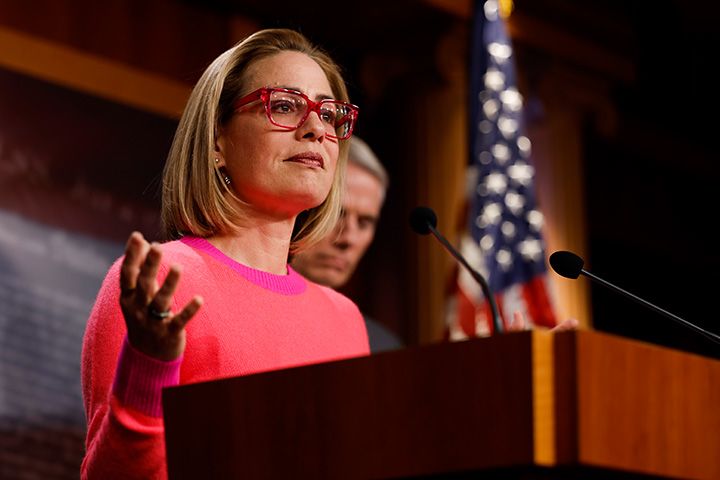Arizona Senator Kyrsten Sinema declared as an independent Friday but made clear she intends to continue to caucus with Democrats, maintaining the party’s newly expanded control of the chamber, committee subpoena power and ability to advance judicial nominees.
(Bloomberg) — Arizona Senator Kyrsten Sinema declared as an independent Friday but made clear she intends to continue to caucus with Democrats, maintaining the party’s newly expanded control of the chamber, committee subpoena power and ability to advance judicial nominees.
Sinema, who has been a swing vote on key issues, said she would continue her centrist voting record, which has angered Democrats in her home state. The move allows her to dodge a certain primary challenge if she seeks reelection in 2024.
“Becoming an independent won’t change my work in the Senate; my service to Arizona remains the same,” she wrote in an op-ed in the Arizona Republic.
Sinema, 46, was first elected to the Senate in 2018 and was censured by the state party in January. The White House, however, stressed on Friday Sinema’s work this year on the bipartisan infrastructure bill and legislation to boost the domestic semiconductor industry.
“We understand that her decision to register as an independent in Arizona does not change the new Democratic majority control of the Senate, and we have every reason to expect that we will continue to work successfully with her,” White House press secretary Karine Jean-Pierre said in a statement.
Sinema’s move comes with risks, however, since a three-way general election race in 2024 likely would benefit Republicans in her narrowly divided state.
Sinema switching party affiliation won’t affect the overall control of the Senate next year. Her office said she intends to keep her committee assignments from the Democratic majority. And she doesn’t intend to caucus with the Republicans.
Jessica Taylor, the Senate editor of Cook Political Report noted that Democrats will still have the 51-49 seat control they secured earlier this week with Senator Raphael Warnock’s reelection in Georgia.
“Democrats have more cushion than they had before,” Taylor said.
That majority gives Democrats expanded subpoena power next year that they intend to use to investigate corporations.
Democrats will still either need Sinema’s backing on votes to confirm important nominees opposed by the GOP, or the vote of West Virginia Senator Joe Manchin, the conservative Democrat who also would face voters next year if he runs for reelection.
That means the duo will continue to hold significant power in a divided Washington where President Joe Biden’s executive authority will play a big role with little prospect for progressive legislation.
Both Sinema and Manchin have reliably voted with their party for Biden’s judicial nominees. Senate Majority Leader Chuck Schumer said this week that a key focus on the chamber next year will be moving more of Biden’s picks to the bench.
Manchin has repeatedly insisted he does not intend to become a Republican. Becoming an independent would likely dilute his support and weaken his reelection chances. At 75, Manchin has not said whether he will run.
Sinema notified Senate Majority Leader Chuck Schumer about her decision on Thursday, according to a Democratic aide. Schumer’s office didn’t immediately respond to a request for comment.
Despite breaks with Democrats on a few key issues, including raising corporate taxes, Sinema has voted with the party 97% of the time, according to data compiled by Bloomberg Government. She also has been a consistent vote in favor of President Joe Biden’s judicial nominees.
Her refusal to vote against the filibuster rule in order to pass gun control and voting rights legislation triggered the Arizona Democratic Party’s censure.
A political action committee dedicated to removing her, called “Primary Sinema,” said in a statement that her move confirmed that she is “simply out for herself.”
“In one way, Sinema just made our jobs easier by bowing out of a Democratic primary she knew she couldn’t win. Now, we’ll beat her in the general election with a real Democrat,” the group said in a statement.
Last month, Democrats won in key races across the once-reliably Republican state, including governor, secretary of state and Arizona’s other US Senate seat.
On Tuesday, Democrats secured a 51-seat majority in the Senate when Warnock was reelected. That gives them firmer control of committees than the 50-50 balance of the last two years, which Democrats controlled only through tie-breaking votes by Vice President Kamala Harris.
There are two other independents in the Senate, Bernie Sanders of Vermont and Angus King of Maine. They have divergent political stands but both caucus with Democrats on matters of the chamber’s organization and consistently vote with the party.
The most consequential switch in recent times was Republican Jim Jeffords of Vermont becoming an independent and caucusing with Democrats in 2001, giving them the Senate majority. And after Senator Joseph I. Lieberman lost his Democratic primary in 2006, he won reelection anyway, and caucused with Democrats as an “independent Democrat.”
(Updates with new detail starting in 13th paragraph)
More stories like this are available on bloomberg.com
©2022 Bloomberg L.P.











